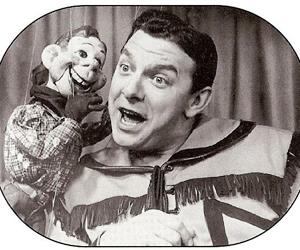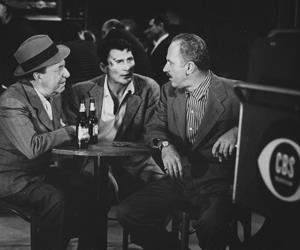Mr. Peabody, the erudite dog in the Bullwinkle cartoons, had his WABAC (“way back”) machine for visiting the past.
George Foster Peabody, no relation, has his own version of the WABAC, though it’s more time capsule than time machine.
A very large time capsule.
It’s called the Peabody Awards Collection.
Just about every radio, TV and web entry in the University of Georgia’s Peabody Awards competition has been filed and preserved in the collection since the awards program was launched some 72 years ago. It now has more than 50,000 titles, making it the nation’s third largest electronic media archive after the Library of Congress and UCLA’s.
And come Tuesday, Sept. 10, Peabody archivists and a group of student curators who’ve gone “way back” into the stacks are going to start showing some of the goodies they’ve found in a series of screenings with the umbrella title The Peabody Decades.
There’ll be two screening nights each month through November, each pair addressing a different decade in Peabody – and U.S. – history. After a holiday hiatus in December, the series will resume in January and click off a decade a month until the present is reached.
The first three months of Decades could be easily be subtitled “Howdy Doody time.”
 Not only will the Sept. 10 “potpourri” screening include a clip of the first children’s TV show to win a Peabody (1948), but Buffalo Bob Smith, his freckled-faced puppet pal Howdy and the kids in the Peanut Gallery stand as a pretty fair symbol of the innocence of TV programming in the 1940s, ’50s and early ’60s. The show’s five-days-a-week run on NBC actually spanned television’s first three decades, premiering in 1947 and wrapping up in the fall of 1960.
Not only will the Sept. 10 “potpourri” screening include a clip of the first children’s TV show to win a Peabody (1948), but Buffalo Bob Smith, his freckled-faced puppet pal Howdy and the kids in the Peanut Gallery stand as a pretty fair symbol of the innocence of TV programming in the 1940s, ’50s and early ’60s. The show’s five-days-a-week run on NBC actually spanned television’s first three decades, premiering in 1947 and wrapping up in the fall of 1960.
To borrow a phrase Howdy made famous long before Bart Simpson swiped it: Cowabunga!
Opening night of The Peabody Decades is a multi-program clip extravaganza dubbed America in the 1940s: More Than the Home Front. It will include excerpts from Howdy Doody, as noted, plus footage from a more obscure kids’ show, Mr. I. Magination; the family comedy I Remember Mama; and Black Robe, one of the earliest courtroom dramas. There will also be excerpts from radio shows about the American war effort.
More than the Home Front is also meant to be an immersive experience. In addition to the radio and TV samples, there’ll be 1940s memorabilia on display and, from 6:30 to 7 p.m., refreshments that include not just the usual cheese and crackers but some famous snack items that were first marketed in the ’40s, among them M&Ms, Tootsie Rolls and Fritos.
The guiding idea behind The Peabody Decades is to illuminate each decade through the lens of programs that won Peabody Awards or were entered in the annual competition. In some cases, that means programs made much later about the decade in question. Thus, the single-program screening set for September 24 will be The Tuskegee Airmen, a 1995 Peabody Award recipient that dramatizes the story of our first African-American fighter pilots during World War II. The HBO movie has a superb cast that includes Laurence Fishburne, Andre Braugher, Cuba Gooding Jr. and John Lithgow.

The October screenings will include America in the 1950s: Drop Out, Not Fall Out (Oct. 8), a potpourri that will spotlight Edward R. Murrow’s See It Now series and a variety of programs about the atom bomb, Sputnik and the Cold War, and Requiem for a Heavyweight (Oct. 22), the celebrated Rod Serling play that was originally performed live on CBS’s Playhouse 90 on Oct. 11, 1956. Jack Palance, better known to today’s audiences for his one-armed pushups and self-spoofing turn in the comedy City Slickers, stars as washed-up boxer “Mountain” McClintock. Keenan Wynn and Kim Hunter head the supporting cast.
A full list of the 2013 screenings can be found at the Peabody event website.
Showtime is 7 p.m. for all the Decades events. All the screenings, displays and follow-up conversation are admission free and open to the general public as well as UGA students, faculty and staff. Event parking will be available in UGA’s Hull Street deck. Come on down to the auditorium of the Richard B. Russell Special Collections Library at 300 Hull Street.
The Peabody past awaits.